表感官的系动词
感官动词系动词
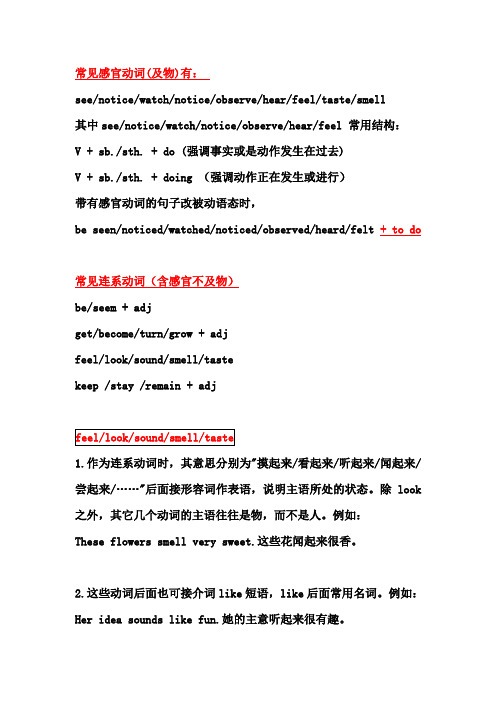
常见感官动词(及物)有:see/notice/watch/notice/observe/hear/feel/taste/smell其中see/notice/watch/notice/observe/hear/feel 常用结构:V + sb./sth. + do (强调事实或是动作发生在过去)V + sb./sth. + doing (强调动作正在发生或进行)带有感官动词的句子改被动语态时,be seen/noticed/watched/noticed/observed/heard/felt + to do常见连系动词(含感官不及物)be/seem + adjget/become/turn/grow + adjfeel/look/sound/smell/tastekeep /stay /remain + adj1.作为连系动词时,其意思分别为"摸起来/看起来/听起来/闻起来/尝起来/……"后面接形容词作表语,说明主语所处的状态。
除look 之外,其它几个动词的主语往往是物,而不是人。
例如:These flowers smell very sweet.这些花闻起来很香。
2.这些动词后面也可接介词like短语,like后面常用名词。
例如:Her idea sounds like fun.她的主意听起来很有趣。
3. 这五个感官动词如果后面接名词作宾语,则这里的感官动词为实义动词,后面必须跟副词修饰动词。
以look一词为例:He looked at me happily. (实义动词,“看”,后有宾语me,用副词happily修饰。
)He looked happy. (系动词,“看起来……”,后接形容词作表语。
)系动词使用注意事项:◇系动词无被动语态。
Your hand feels cold.The dish tastes good.◇系动词常用在某些词组中:stay healthy(保持健康), come true(实现), fall asleep(睡觉), go bad(变质)。
系动词分类及用法

1)状态系动词用来表示主语状态,只有be一词,例如:He is a teacher.他是一名教师。
(is与补足语一起说明主语的身份。
)2)持续系动词用来表示主语继续或保持一种状况或态度,主要有keep, rest, remain, stay, lie, stand, 例如:He always kept silent at meeting.他开会时总保持沉默。
This matter rests a mystery.此事仍是一个谜。
3)表像系动词用来表示"看起来像"这一概念,主要有seem, appear, look, 例如:He looks tired.他看起来很累。
He seems (to be) very sad.他看起来很伤心。
4)感官系动词感官系动词主要有feel, smell, sound, taste, 例如:This kind of cloth feels very soft.这种布手感很软。
This flower smells very sweet.这朵花闻起来很香。
5)变化系动词这些系动词表示主语变成什么样,变化系动词主要有become, grow, turn, fall, get, go, come, run.例如:He became mad after that.自那之后,他疯了。
She grew rich within a short time.她没多长时间就富了。
6)终止系动词表示主语已终止动作,主要有prove, trun out, 表达"证实","变成"之意,例如:The rumor proved false.这谣言证实有假。
The search proved difficult.搜查证实很难。
His plan turned out a success.他的计划终于成功了。
(turn out表终止性结果)since的四种用法1) since +过去一个时间点(如具体的年、月、日期、钟点、1980, last month, half past six)。
感官系动词
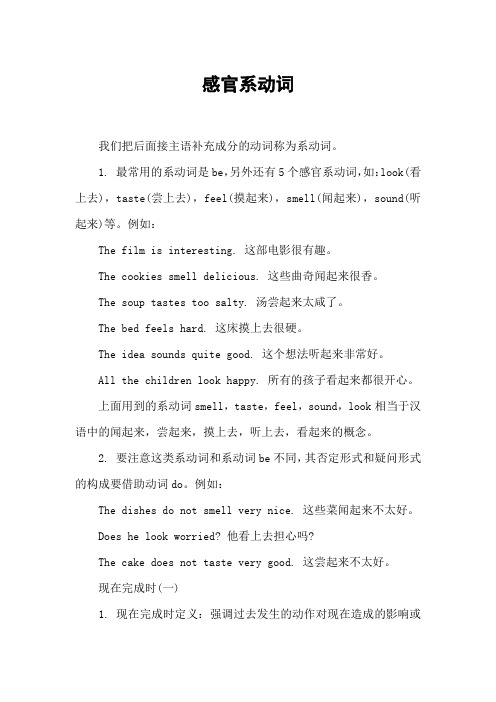
感官系动词我们把后面接主语补充成分的动词称为系动词。
1. 最常用的系动词是be,另外还有5个感官系动词,如:look(看上去),taste(尝上去),feel(摸起来),smell(闻起来),sound(听起来)等。
例如:The film is interesting. 这部电影很有趣。
The cookies smell delicious. 这些曲奇闻起来很香。
The soup tastes too salty. 汤尝起来太咸了。
The bed feels hard. 这床摸上去很硬。
The idea sounds quite good. 这个想法听起来非常好。
All the children look happy. 所有的孩子看起来都很开心。
上面用到的系动词smell,taste,feel,sound,look相当于汉语中的闻起来,尝起来,摸上去,听上去,看起来的概念。
2. 要注意这类系动词和系动词be不同,其否定形式和疑问形式的构成要借助动词do。
例如:The dishes do not smell very nice. 这些菜闻起来不太好。
Does he look worried? 他看上去担心吗?The cake does not taste very good. 这尝起来不太好。
现在完成时(一)1. 现在完成时定义:强调过去发生的动作对现在造成的影响或结果。
例如:Betty went to the park yesterday. (强调去公园的动作发生在昨天)Betty has been to the park before. (强调不仅去过公园,而且了解公园的状况)2. 现在完成时的谓语结构:have/has + 动词的过去分词例如:Ive always wanted to go on a dream holiday.句中的谓语结构为:have wantedLingling has visited the US.句中的谓语结构为:has visited3. 句式结构(1)肯定句式:主语+have / has+动词过去分词+其他。
1感官系动词讲解与练习
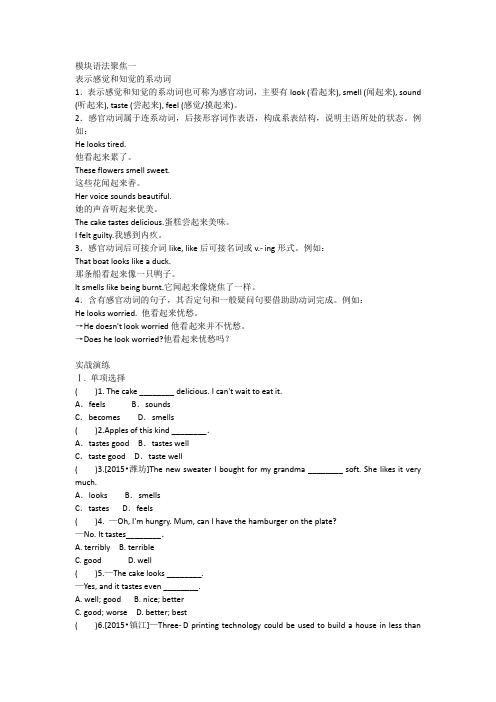
模块语法聚焦一表示感觉和知觉的系动词1.表示感觉和知觉的系动词也可称为感官动词,主要有look (看起来), smell (闻起来), sound (听起来), taste (尝起来), feel (感觉/摸起来)。
2.感官动词属于连系动词,后接形容词作表语,构成系表结构,说明主语所处的状态。
例如:He looks tired.他看起来累了。
These flowers smell sweet.这些花闻起来香。
Her voice sounds beautiful.她的声音听起来优美。
The cake tastes delicious.蛋糕尝起来美味。
I felt guilty.我感到内疚。
3.感官动词后可接介词like, like后可接名词或v.ing形式。
例如:That boat looks like a duck.那条船看起来像一只鸭子。
It smells like being burnt.它闻起来像烧焦了一样。
4.含有感官动词的句子,其否定句和一般疑问句要借助助动词完成。
例如:He looks worried. 他看起来忧愁。
→He doesn't look worried他看起来并不忧愁。
→Does he look worried?他看起来忧愁吗?实战演练Ⅰ. 单项选择()1. The cake ________ delicious. I can't wait to eat it.A.feels B.soundsC.becomes D.smells()2.Apples of this kind ________.A.tastes good B.tastes wellC.taste good D.taste well()3.[2015•潍坊]The new sweater I bought for my grandma ________ soft. She likes it very much.A.looks B.smellsC.tastes D.feels()4. —Oh, I'm hungry. Mum, can I have the hamburger on the plate?—No. It tastes________.A. terriblyB. terribleC. goodD. well()5.—The cake looks ________.—Yes, and it tastes even ________.A. well; goodB. nice; betterC. good; worseD. better; best()6.[2015•镇江]—ThreeD printing technology could be used to build a house in less than24 hours.—It ________ amazing. It's my first time to get to know the news.A.looks B.smells C.sounds D.tastes()7.Oh, it________so nice. What beautiful music it is!A.smells B.soundsC.tastes D.looks()8.—Dinner is ready. Help yourself!—Wow! It ________ delicious. You are really good at cooking.A.looks B.soundsC.tastes D.feels()9.—Let's go on a picnic this weekend, OK?—That sounds________.A.great B.wellC.hardly D.terribly()10.I like to read English in the garden because the flowers in it smell ________. A.good B.wellC.bad D.badly()11.—Do you like swimming in winter?—Of course. The water ________ a bit cold at first, but then I am warm and full of energy. A.tastes B.feelsC.smells D.looks()12.Mum is making dinner. It ________ so nice!A.smells B.tastesC.feels D.sounds()13.Good medicine for health ________ bitter to the mouth.A.feel B.tastes C.feels D.taste()14.Some of my friends eat with their eyes. They prefer to order what ________ nice. A.feels B.smells C.looks D.tastes()15.—Do you know the song Gangnam Style?—Of course. It ________ interesting.A.tastes B.smells C.sounds D.feelsⅡ.根据汉语意思完成句子1.我的毛衣摸起来柔软。
初中英语系动词用法
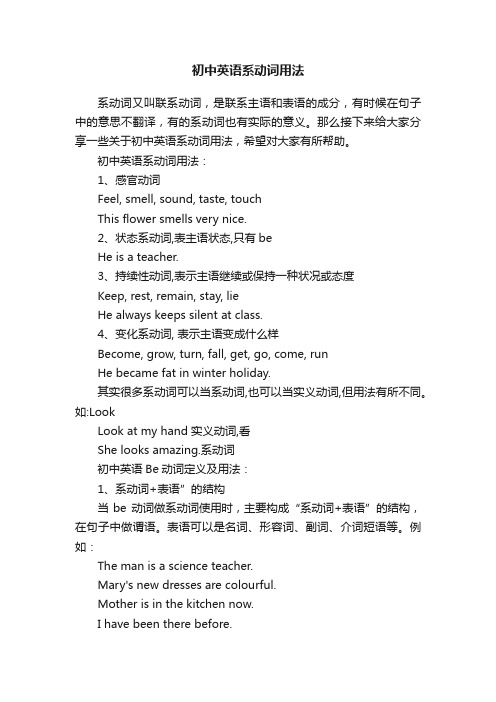
初中英语系动词用法系动词又叫联系动词,是联系主语和表语的成分,有时候在句子中的意思不翻译,有的系动词也有实际的意义。
那么接下来给大家分享一些关于初中英语系动词用法,希望对大家有所帮助。
初中英语系动词用法:1、感官动词Feel, smell, sound, taste, touchThis flower smells very nice.2、状态系动词,表主语状态,只有beHe is a teacher.3、持续性动词,表示主语继续或保持一种状况或态度Keep, rest, remain, stay, lieHe always keeps silent at class.4、变化系动词, 表示主语变成什么样Become, grow, turn, fall, get, go, come, runHe became fat in winter holiday.其实很多系动词可以当系动词,也可以当实义动词,但用法有所不同。
如:LookLook at my hand 实义动词,看She looks amazing.系动词初中英语Be动词定义及用法:1、系动词+表语”的结构当be 动词做系动词使用时,主要构成“系动词+表语”的结构,在句子中做谓语。
表语可以是名词、形容词、副词、介词短语等。
例如:The man is a science teacher.Mary's new dresses are colourful.Mother is in the kitchen now.I have been there before.They shall be here at 10:00 tommorow.That can't be true.You are not being very polite.Your brother is being very annoying this evening2、be 动词的一般疑问句,方法是把be 移到主语前面,也可说成是移到句首。
感官动词
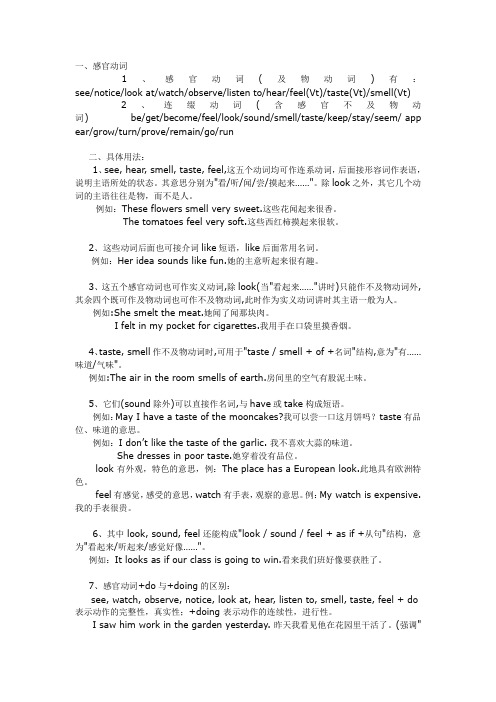
一、感官动词1、感官动词(及物动词)有:see/notice/look at/watch/observe/listen to/hear/feel(Vt)/taste(Vt)/smell(Vt)2、连缀动词(含感官不及物动词) be/get/become/feel/look/sound/smell/taste/keep/stay/seem/ app ear/grow/turn/prove/remain/go/run二、具体用法:1、see, hear, smell, taste, feel,这五个动词均可作连系动词,后面接形容词作表语,说明主语所处的状态。
其意思分别为"看/听/闻/尝/摸起来……"。
除look之外,其它几个动词的主语往往是物,而不是人。
例如:These flowers smell very sweet.这些花闻起来很香。
The tomatoes feel very soft.这些西红柿摸起来很软。
2、这些动词后面也可接介词like短语,like后面常用名词。
例如:Her idea sounds like fun.她的主意听起来很有趣。
3、这五个感官动词也可作实义动词,除look(当"看起来……"讲时)只能作不及物动词外,其余四个既可作及物动词也可作不及物动词,此时作为实义动词讲时其主语一般为人。
例如:She smelt the meat.她闻了闻那块肉。
I felt in my pocket for cigarettes.我用手在口袋里摸香烟。
4、taste, smell作不及物动词时,可用于"taste / smell + of +名词"结构,意为"有……味道/气味"。
例如:The air in the room smells of earth.房间里的空气有股泥土味。
5、它们(sound除外)可以直接作名词,与have或take构成短语。
常用的连系动词

简单句的五种基本结构相关知识一、常用的连系动词大致可分为三类:1)表示具有某种性质、特征或处于某种状态的(感官)系动词,如:be,appear,seem,look,taste,sound,feel,smell等。
例如:The story of his life sounds interesting.他的生平听起来很有趣。
The plan looks good on paper,but will it work?这个计划从纸面上看不错,但能行得通吗?The house appeared deserted.那所房子看来无人居住2)表示状态变化的系动词,如:become,come,fall,get,go,grow,turn,run,turn out等。
例如:Leaves turn yellow in the autumn.树叶在秋天变黄。
The post of headmaster fell/became vacant.校长的位子空了下来。
The sound of the music grew faint as the band marched away.音乐声随着乐队走远而渐渐减弱。
3)表示某种持续状态的系动词,如:keep,remain,stay,rest,lie,stand等。
例如:Few of the houses there remained standing after the earthquake.地震过后,那里没有几所房子没有倒塌。
The book lay open on the table.那本书摊开放在桌子上。
The weather has stayed warm all week.天气整个星期都很暖和。
注意:(1)系动词后跟什么样的表语并不是任意的,有一些固定搭配需特别记忆。
如:get ready(准备好了),get dark[(天)变黑],turn red /yellow(变红/黄),go bad /mad(变坏/变疯),go wrong(出错),keep silent(保持沉默),come true(实现了),fall asleep(睡着了),fall ill(生病),等。
感官动词系动词
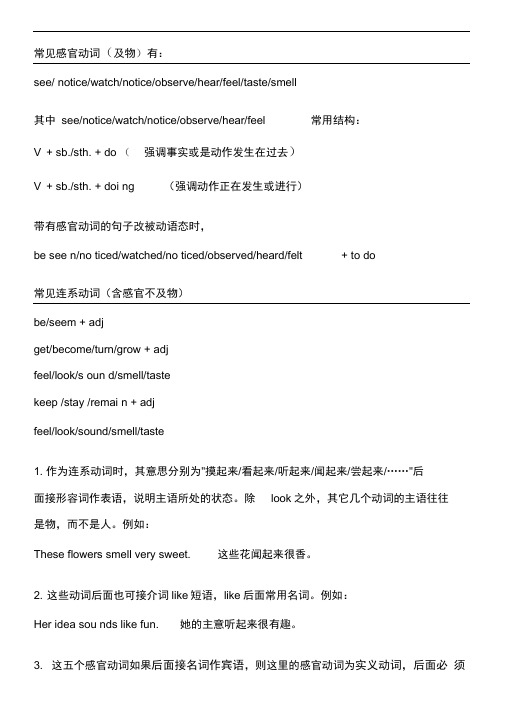
常见感官动词(及物)有:see/ notice/watch/notice/observe/hear/feel/taste/smell其中see/notice/watch/notice/observe/hear/feel 常用结构:V + sb./sth. + do (强调事实或是动作发生在过去)V + sb./sth. + doi ng (强调动作正在发生或进行)带有感官动词的句子改被动语态时,be see n/no ticed/watched/no ticed/observed/heard/felt + to do常见连系动词(含感官不及物)be/seem + adjget/become/turn/grow + adjfeel/look/s oun d/smell/tastekeep /stay /remai n + adjfeel/look/sound/smell/taste1. 作为连系动词时,其意思分别为"摸起来/看起来/听起来/闻起来/尝起来/……"后面接形容词作表语,说明主语所处的状态。
除look之外,其它几个动词的主语往往是物,而不是人。
例如:These flowers smell very sweet. 这些花闻起来很香。
2. 这些动词后面也可接介词like短语,like后面常用名词。
例如:Her idea sou nds like fun. 她的主意听起来很有趣。
3. 这五个感官动词如果后面接名词作宾语,则这里的感官动词为实义动词,后面必须跟副词修饰动词。
以look 一词为例:He looked at me happily.(实义动词,“看”,后有宾语me用副词happily 修饰。
)He looked happy. (系动词,“看起来,后接形容词作表语。
)系动词使用注意事项:◊系动词无被动语态。
Your hand feels cold.The dish tastes good.◊系动词常用在某些词组中:stay healthy (保持健康), come true (实现)fall asleep (睡觉), go bad (变质)。
- 1、下载文档前请自行甄别文档内容的完整性,平台不提供额外的编辑、内容补充、找答案等附加服务。
- 2、"仅部分预览"的文档,不可在线预览部分如存在完整性等问题,可反馈申请退款(可完整预览的文档不适用该条件!)。
- 3、如文档侵犯您的权益,请联系客服反馈,我们会尽快为您处理(人工客服工作时间:9:00-18:30)。
表感官的系动词
集团企业公司编码:(LL3698-KKI1269-TM2483-LUI12689-ITT289-
1.表感官的系动词:look,sound,taste,smell,feel(这些词用形容词作表语)
2.表似乎的系动词seem,appear
3.表变化的系动词:become,get,turn,grow,make,come,go,fall,run
4.表依旧的系动词:
remain,keep,stay,continue,stand,rest,lie,hold
5.可带名词作表语的系动词:
become,make,look,sound,fall,prove,remain,turn(该词后接的单数名词前多不用冠词。
如:Heturnedteacher.)
6.如果读者对于这个语法现象还是不怎么理解的话,可以以这个名句为例子学学:themanwhodiesrichdiesdisgraced.在巨富中死去,是一种耻辱。
其中的richanddisgraced是说明主语的性质的。
1)状态系动词用来表示主语状态,只有be一词,例如:Heisateacher. 他是一名教师。
(is与补足语一起说明主语的身份。
)2)持续系动词用来表示主语继续或保持一种状况或态度,主要有keep,rest,remain,stay,lie,stand,例如:Healwayskeptsilentatmeeting. 他开会时总保持沉默。
Thismatterrestsamystery. 此事仍是一个谜。
3)表像系动词用来表示"看起来像"这一概念,主要有
seem,appear,look,例如:Helookstired. 他看起来很累。
Heseems(tobe)verysad. 他看起来很伤心。
4)感官系动词感
官系动词主要有feel,smell,sound,taste,例如:Thiskindofclothfeelsverysoft. 这种布手感很软。
Thisflowersmellsverysweet. 这朵花闻起来很香。
5)变化系动词这些系动词表示主语变成什么样,变化系动词主要有become,grow,turn,fall,get,go,come,run. 例如:Hebecamemadafterthat. 自那之后,他疯了。
Shegrewrichwithinashorttime. 她没多长时间就富了。
6)终止系动词表示主语已终止动作,主要有prove,turnout,表达"证实","变成"之意,例如:Therumorprovedfalse. 这谣言证实有假。
Thesearchproveddifficult. 搜查证实很难。
Hisplanturnedoutasuccess. 他的计划终于成功了。
(turnout表终止性结果)注意:可带名词作表语的系动词
be,become,make,look,sound,fall,prove,remain,turn后接的单数名词前多不用冠词。
2.系动词无被动语态:
appear,bebecome,fall,feel,get,grow,keep,look,remain,seem,smell, sound,stay,taste,turn 如:Itsoundsgood.。
